In search of that radiant, healthy-looking skin we often dabble in a wealth of skincare goods and procedures. However, natural skin care remedies have been proving to be just as effective, without the added synthetic chemicals! You can handle common problems, such as acne and dryness, easily strikingly with things found in your household using homemade skin care remedies. In this article, we have compiled a list of 15 super easy DIY’s that can revamp your skincare routine and give you glowing skin in no time.
1. Aloe Vera for Soothing Skin:
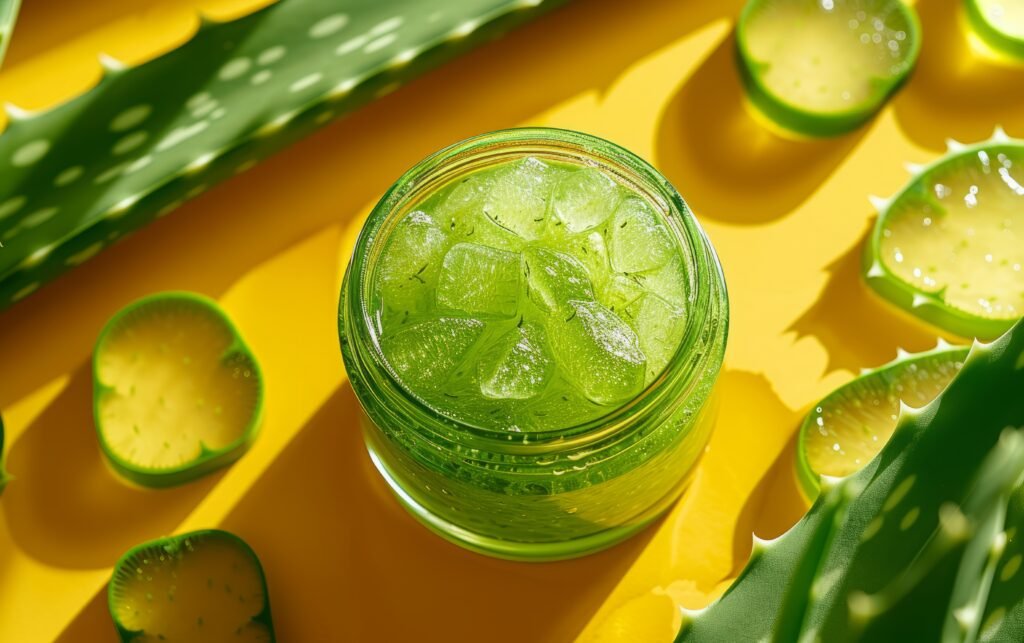
There are many natural skin care remedies available, but aloe vera seems to top the list as far as all around health and wellness applications go. Widely available worldwide, this wonderful plant has been prized for thousands of years due to its many applications for skin. The gel of the plant is well known for its soothing and healing properties, making it a frequent choice in home based skin care solutions. This not only provides relief from the sting of sunburn and replenishes moisture in dry skin, but also works to effectively reduce inflammation. Aloe vera is also versatile enough that it can be incorporated into your skincare regimen, providing delicate yet powerful results. Including this natural product will be very model to improve your skin tone and overall health even more.
How Aloe Vera Can Help with Skin Irritations
The gel of aloe vera is filled with vitamins, minerals and antioxidants—making it natural powerhouse. The presence of these nutrients is essential for the cure of skin problems. An example of this could be using the anti-inflammatory properties that aloe vera can provide when we have sunburns from keeping too much time under the Sun. It calms the skin with a cooling effect, eliminates redness and creates conditions for faster recovery.
It is great for those of who have dry skin that peels, helping to hydrate your complexion. The deep penetration of this topical formula gives the skin layers its moisturizing properties that cure dry dehydrated dermis and results in young soft smooth tail. ALOE VERA ALSO HELPS FOR SENSITIVE OR IRRITATED SKIN. This calming herb is great for easing pain and inflammation because it has anti-inflammatory properties.
How to Use Aloe Vera
But to obtain all the benefits of Aloe Vera you only need:
- To extract fresh gel: Take a leaf of Aloe Vera plant, cut the base. Cut it and take out the slimy clear gel with a spoon. Fresh Aloe Gel is Ready to Use: The fresh gel contains active compounds, and they are at their most potent when used on the skin.
- Commercial Aloe Vera Gel: If you do not have fresh aloe vera, use the best quality commercial aloe vera gel instead. Have it pure, without any additional chemicals or artificial scents.
- Usage– Aloe Vera gel is to be applied on the affected areas of your skin this should be done once daily. RUB on Areas for Sunburn, Dry Spots or Irritation: — Massage GEL Into the Skin Until Fully Absorbed Aloe Vera can be applied daily to keep your skin healthy and moisturized or as needed.
How It Works
Aloe vera polysaccharides are what make the plant so beneficial because they create a film on the skin that protects it to help speed up recovery. It helps lock in moisture & supports your skin’s natural healing processes. Not only that, aloe vera also has anti-inflammatory effects to soothe the irritation and redness present in the situation: an excellent combination for your DIY skin remedies routine.
In any case, the aloe vera plant may just be nature’s very own gift to help soothe sunburn, treat dryness and fight inflammation if nothing else can work for you.
Read also: Men’s Skincare Routine: Simple and Effective Skincare Tips
2. Tea Tree Oil for Acne Relief:

Tea tree oil is widely recognized for its powerful role in natural skin care remedies, particularly for tackling acne. This essential oil, derived from the leaves of the Melaleuca alternifolia tree, is celebrated for its remarkable antibacterial and anti-inflammatory properties. As such, it’s an indispensable addition to your homemade skin care remedies collection.
How Tea Tree Oil Helps Reduce Acne and Inflammation
Firstly, tea tree oil’s effectiveness in combating acne can be attributed to its high content of terpinen-4-ol. This compound is known for its ability to target and neutralize acne-causing bacteria. Consequently, it helps to reduce the severity of blemishes, minimizing both inflammation and redness. By incorporating tea tree oil into your skincare routine, you can effectively address acne issues and promote clearer skin.
How to Use Tea Tree Oil
To harness the benefits of tea tree oil, follow these steps:
- Dilution: Begin by diluting the tea tree oil with a carrier oil such as coconut or jojoba oil. A common ratio is 1:1, meaning equal parts of each oil. This dilution is essential because undiluted tea tree oil can be too potent and may cause skin irritation.
- Application: Using a cotton swab, gently apply the diluted tea tree oil directly to the affected areas of your skin. Be careful to avoid the surrounding healthy skin, as concentrated oil can cause dryness or irritation.
- Frequency: For best results, apply the treatment once or twice daily, depending on your skin’s sensitivity and the severity of the acne. Consistent use can help prevent future breakouts and maintain a clearer complexion.
How It Works
Tea tree oil’s effectiveness lies in its ability to penetrate the skin and target bacteria responsible for acne. By reducing bacterial growth, it minimizes inflammation and helps to clear existing blemishes. Furthermore, the anti-inflammatory properties of tea tree oil assist in calming irritated skin, making it a valuable component of any natural skin care remedies routine.
In summary, tea tree oil offers a natural, effective solution for acne relief. By incorporating this essential oil into your skincare regimen, you can address acne concerns while benefiting from its soothing properties.
Read also: Determining Your Skin Type: Essential Skincare Tips
3.Coconut Oil as a Moisturizer:
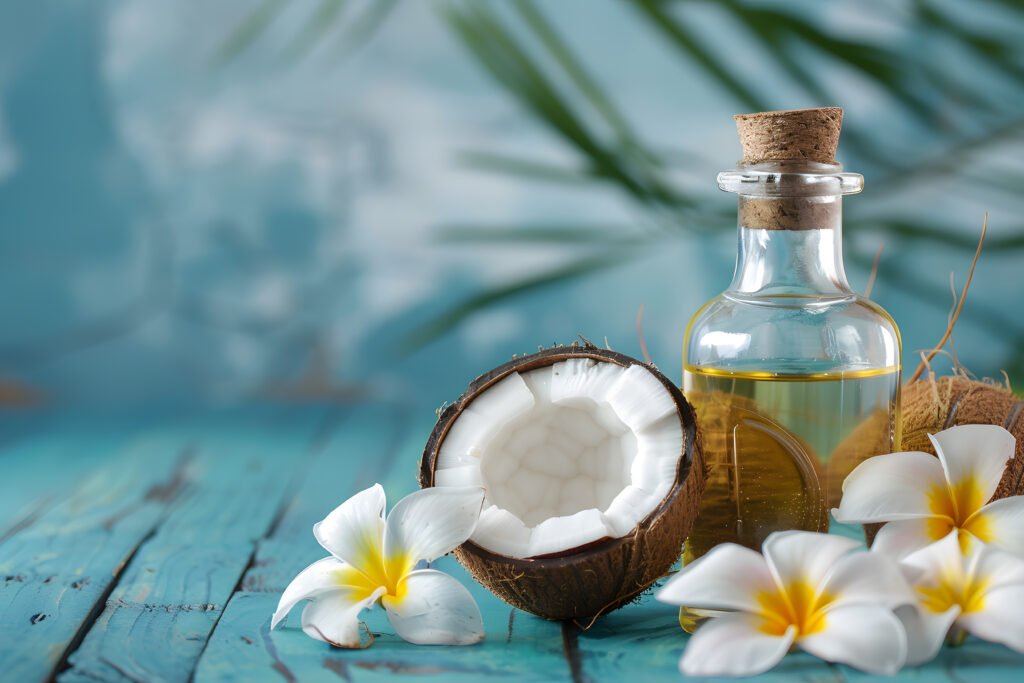
Coconut oil stands out as a highly effective natural skin care remedy, thanks to its rich composition of lauric acid. This natural emollient provides an excellent solution for moisturizing dry skin and addressing skin conditions like eczema.
Why Coconut Oil Works
To begin with, coconut oil’s lauric acid content plays a crucial role in its moisturizing capabilities. This fatty acid helps to deeply hydrate the skin by penetrating the outer layers. As a result, it effectively combats dryness and maintains skin softness. Additionally, coconut oil’s antimicrobial properties contribute to overall skin health, making it a versatile choice among homemade skin care remedies.
How to Use Coconut Oil
Here’s how you can incorporate coconut oil into your skincare routine:
- Application: Simply massage a small amount of coconut oil into your skin. For optimal results, do this after bathing when your skin is still slightly damp. This helps to lock in moisture more effectively.
- Frequency: Apply the oil as needed throughout the day, particularly in areas prone to dryness or irritation. Regular use can enhance skin hydration and reduce the appearance of rough patches.
- Additional Tips: If you have sensitive skin or are prone to acne, consider using virgin or organic coconut oil to minimize the risk of irritation. Additionally, performing a patch test before full application can help ensure the oil does not cause any adverse reactions.
How It Works
By penetrating deeply into the skin, coconut oil delivers essential fatty acids that provide lasting hydration. Moreover, its antimicrobial properties help protect the skin from harmful bacteria, supporting overall skin health. Therefore, incorporating coconut oil into your skincare routine not only moisturizes but also offers additional benefits.
In conclusion, coconut oil is a valuable addition to any natural skin care remedies collection. Its deep hydration and antimicrobial properties make it an excellent choice for those seeking a natural, effective moisturizer.
4. Apple Cider Vinegar for pH Balance:

Apple cider vinegar (ACV) is a fantastic natural skin care remedy that can help restore your skin’s pH balance and address acne issues. Thanks to its acetic acid content, ACV offers a simple yet effective solution for maintaining healthy skin.
Why Apple Cider Vinegar Works
Firstly, ACV’s natural acidity is key to its effectiveness. By applying it to your skin, you can help correct pH imbalances that often lead to skin problems. This balance is crucial for controlling bacteria and reducing acne flare-ups. Furthermore, ACV acts as a gentle exfoliant, removing dead skin cells and promoting a clearer complexion.
How to Use Apple Cider Vinegar
Here’s a step-by-step guide to incorporating ACV into your skincare routine:
- Dilution: Mix equal parts of apple cider vinegar and water. This dilution is essential to prevent irritation and ensure safe application.
- Application: Soak a cotton ball in the diluted solution and gently apply it to your skin. Focus on areas where you experience acne or pH imbalances.
- Timing: Allow the solution to sit on your skin for a few minutes. This gives the vinegar time to work without causing excessive dryness or irritation.
- Rinsing: After a few minutes, rinse your face thoroughly with lukewarm water to remove any residue. Follow up with your regular moisturizer to keep your skin hydrated.
How It Works
Apple cider vinegar’s acidity helps to balance the skin’s pH, which is often disrupted by various factors, including environmental stressors and improper skincare products. By restoring this balance, ACV not only controls acne-causing bacteria but also gently exfoliates the skin, leading to a fresher, clearer appearance.
In summary, apple cider vinegar is a valuable addition to your homemade skin care remedies arsenal. Its ability to balance pH, combat bacteria, and exfoliate makes it an effective choice for achieving healthier skin.
5. Honey for Hydration and Healing:

Honey is a natural marvel in the realm of natural skin care remedies. Renowned for its exceptional hydrating and healing properties, honey can transform your skincare routine.
Why Honey Works
To begin with, honey is a natural humectant, which means it attracts and retains moisture. This property is essential for keeping your skin hydrated and plump. Additionally, honey contains antioxidants and antibacterial compounds that aid in healing and soothing irritated skin. Therefore, it’s particularly beneficial for conditions like dry patches and minor cuts.
How to Use Honey
Here’s how you can incorporate honey into your skincare routine:
Application: Start by applying a thin layer of raw honey directly to clean, dry skin. You can use it on your face or other areas in need of extra hydration.
Wait Time: Let the honey sit for about 10 to 15 minutes. This duration allows the honey’s natural enzymes and nutrients to deeply penetrate the skin.
Rinsing: After the waiting period, rinse off the honey with lukewarm water. Gently pat your skin dry with a clean towel.
Moisturize: Next, follow up with a moisturizer to lock in the benefits and keep your skin supple. By doing so, you’ll enhance the hydration and nourishment that honey provides.
How It Works
Honey’s unique composition makes it a standout in homemade skin care remedies. Its natural humectant properties draw moisture into the skin, while its antioxidants and antibacterial agents promote healing and protect against further irritation. Consequently, this combination helps to keep your skin hydrated, smooth, and healthy.
In conclusion, honey is an excellent choice for anyone seeking a natural solution to skin hydration and healing. Its ease of use and powerful benefits make it a staple in effective DIY skincare routines.
6. Turmeric for Reducing Inflammation
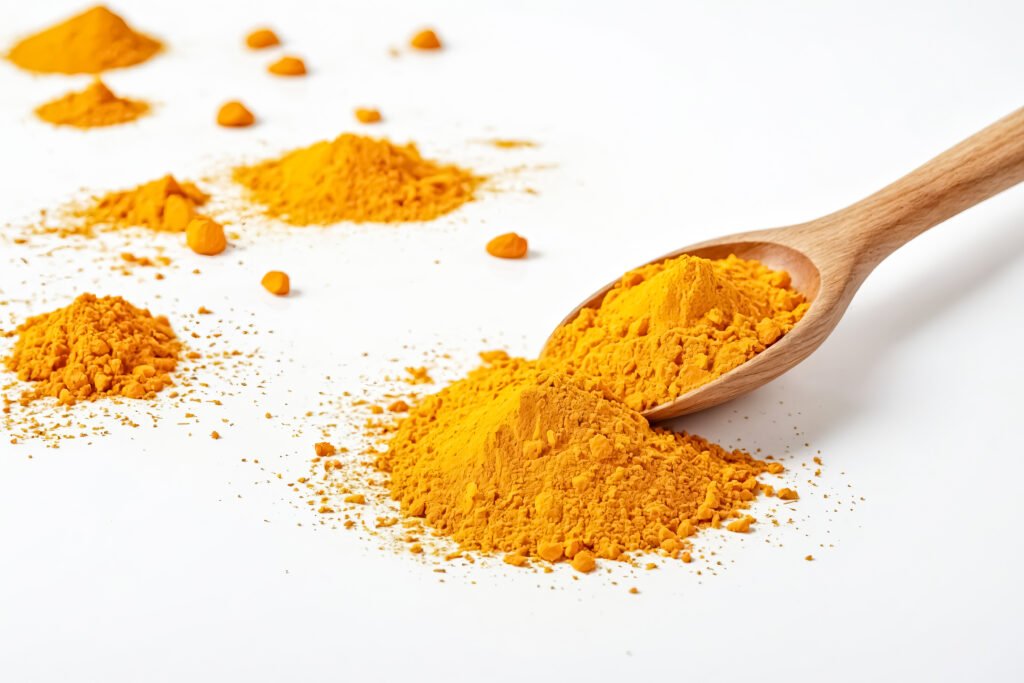
Turmeric is celebrated in the world of natural skin care remedies for its powerful anti-inflammatory and antioxidant properties. Thanks to its active compound, curcumin, turmeric can be a game-changer in your skincare routine.
Why Turmeric Works
To start with, turmeric contains curcumin, which is renowned for its ability to combat inflammation. This makes it particularly effective for soothing skin conditions such as acne and eczema. Furthermore, its antioxidant properties help protect the skin from damage and promote a healthier complexion. Consequently, turmeric is a valuable addition to your homemade skin care remedies.
How to Use Turmeric
Follow these simple steps to harness the benefits of turmeric for your skin:
- Create a Paste: Begin by mixing turmeric powder with either honey or water to form a smooth paste. Honey adds moisturizing benefits, while water is a good option if you prefer a lighter consistency.
- Application: Apply the turmeric paste evenly to the affected areas of your skin. Be cautious, as turmeric can stain clothing and surfaces.
- Wait Time: Allow the paste to sit on your skin for about 10 to 15 minutes. This waiting period enables the curcumin to work its magic.
- Rinsing: Gently rinse off the paste with lukewarm water. You may need to use a mild cleanser to completely remove any residual turmeric.
How It Works
Curcumin in turmeric acts as a natural anti-inflammatory agent, reducing redness and swelling. Additionally, its antioxidant properties help to neutralize free radicals, further enhancing skin health. Thus, turmeric effectively calms irritated skin and improves overall texture.
In summary, incorporating turmeric into your skincare routine can provide significant relief from inflammation and skin irritation. Its natural properties make it an excellent choice for those seeking effective DIY skin care solutions.
7. Green Tea for Soothing Irritation:
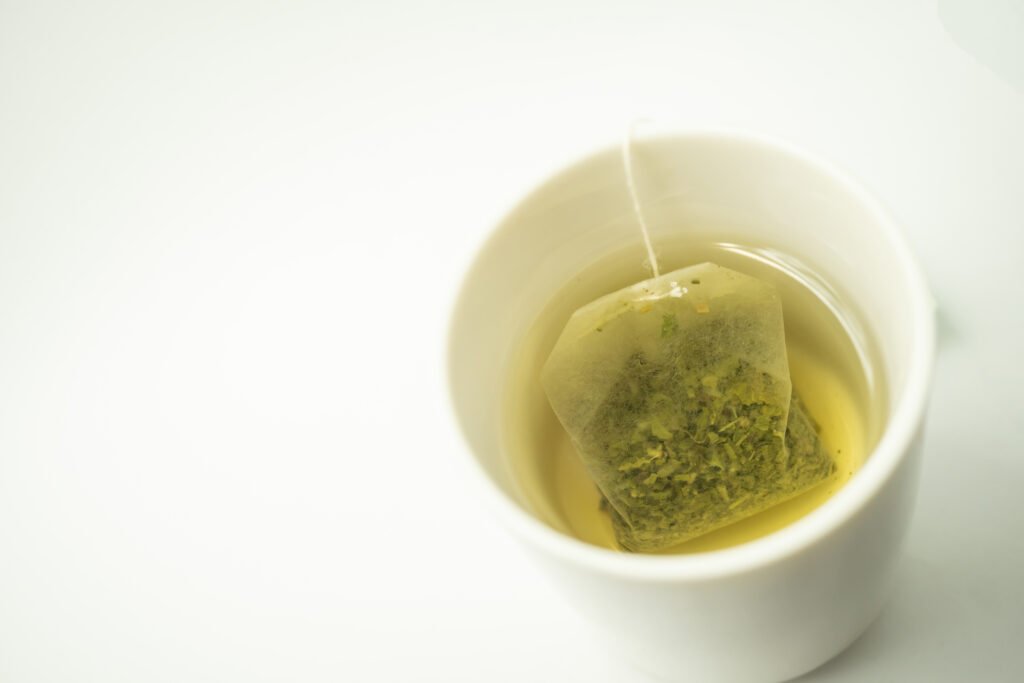
Green tea is a powerhouse in the realm of natural skin care remedies thanks to its high content of antioxidants, particularly EGCG (epigallocatechin gallate). This makes it an excellent choice for calming irritated skin and offering a range of skin benefits.
Why Green Tea Works
Firstly, green tea is rich in catechins, which are known for their anti-inflammatory properties. As a result, these antioxidants can effectively soothe irritated skin and reduce redness. Additionally, green tea helps to regulate sebum production, which can be beneficial for those dealing with oily or acne-prone skin. In this way, green tea serves as a versatile ingredient in your homemade skin care remedies.
How to Use Green Tea
To make the most of green tea’s skin-soothing benefits, follow these simple steps:
- Brew Green Tea: Start by brewing a cup of green tea. Allow it to steep for a few minutes to ensure you extract the maximum amount of antioxidants.
- Cool the Tea: Once brewed, let the green tea cool to room temperature. This step is crucial as applying hot tea could irritate your skin further.
- Application: Use a cotton ball to gently apply the cooled green tea to your skin. Alternatively, you can incorporate green tea into your skincare products for added benefits.
- Rinse (Optional): If preferred, you can rinse your skin with lukewarm water after applying the green tea. However, leaving it on your skin can provide longer-lasting benefits.
How It Works
The catechins found in green tea help to calm irritated skin by reducing inflammation and redness. Moreover, they offer protection against UV damage, which is crucial for maintaining healthy skin. By regulating sebum production, green tea also helps to balance oily skin, making it a valuable addition to your natural skincare routine.
In summary, incorporating green tea into your skincare regimen can significantly soothe irritation and improve skin health. Its natural properties make it a must-try among DIY skin care solutions.
8. Neem for Acne and Inflammation

Neem is a remarkable ingredient in the world of natural skin care remedies, renowned for its powerful antibacterial, antifungal, and anti-inflammatory properties. This makes it an excellent choice for tackling acne and soothing inflammation.
Why Neem Works
Neem’s effectiveness stems from its high concentration of active compounds, including azadirachtin, which provide multiple benefits for the skin. Specifically, neem oil targets acne-causing bacteria, helping to clear up blemishes and prevent future breakouts. Furthermore, its anti-inflammatory properties reduce redness and swelling, making it ideal for calming irritated skin. Therefore, neem is a valuable asset in your homemade skin care remedies.
How to Use Neem
To incorporate neem into your skincare routine, follow these straightforward steps:
- Prepare Neem Oil: Start by diluting neem oil with a carrier oil such as coconut or jojoba oil. The recommended ratio is usually 1 part neem oil to 1 part carrier oil. This dilution helps to prevent irritation and ensures that the neem oil is gentle on the skin.
- Apply to Affected Areas: Using a cotton swab or your fingertips, gently apply the diluted neem oil to the areas of your skin affected by acne or inflammation. Be sure to focus on the areas that need the most attention.
- Leave On: Allow the neem oil to sit on your skin for at least 30 minutes. For best results, consider applying it before bedtime and leaving it on overnight.
- Rinse: After the application time has passed, rinse your skin with lukewarm water. Pat your skin dry with a clean towel.
How It Works
The active compounds in neem oil effectively combat acne-causing bacteria, reducing the frequency and severity of breakouts. Additionally, neem’s anti-inflammatory properties help to minimize redness and swelling, promoting a more even and calm complexion. By incorporating neem into your routine, you can address acne and inflammation naturally and effectively.
In conclusion, neem offers a potent, natural solution for managing acne and soothing irritated skin. Its versatile properties make it a valuable addition to your DIY skin care solutions, helping you achieve healthier, clearer skin.
9. Oatmeal for Sensitive Skin
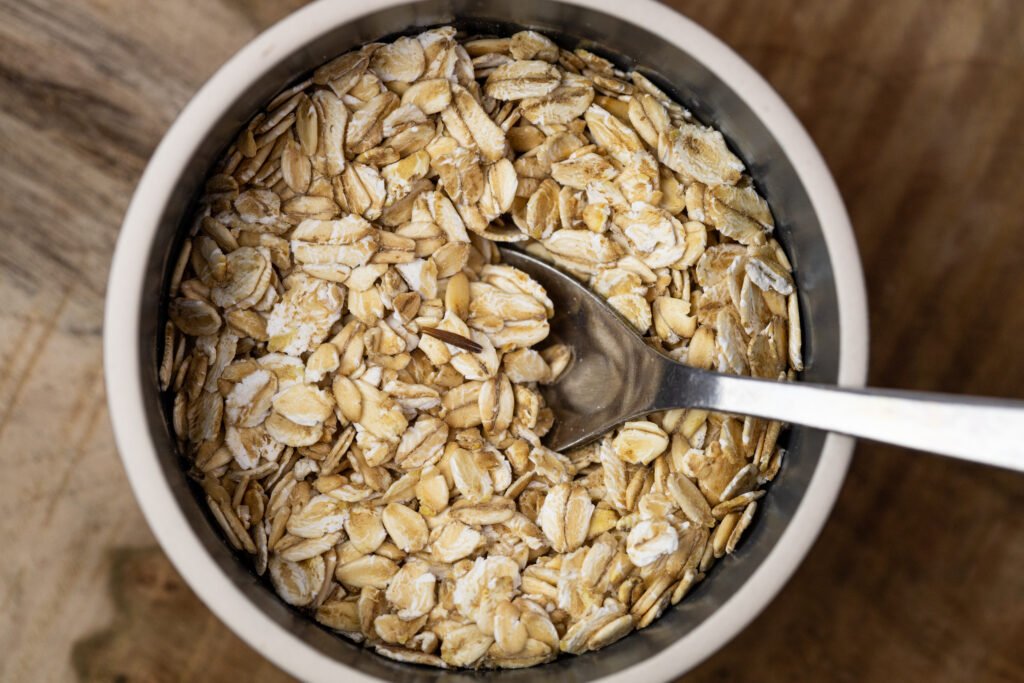
Oatmeal is a fantastic ingredient for those with sensitive or irritated skin, thanks to its gentle yet effective anti-inflammatory properties. This natural remedy can provide significant relief from various skin conditions.
Why Oatmeal Works
Oatmeal is renowned for its soothing qualities, which make it an ideal choice for calming sensitive skin. Its anti-inflammatory compounds help to reduce redness and irritation, while its natural saponins gently cleanse the skin without stripping away essential moisture. As a result, oatmeal is highly effective in managing conditions like eczema and sunburn.
How to Use Oatmeal
To make the most of oatmeal for sensitive skin, follow these simple steps:
- Add to Bath: For a full-body treatment, add colloidal oatmeal to a warm bath. The recommended amount is typically 1-2 cups of oatmeal. Soak in the bath for about 15-20 minutes, allowing the oatmeal to interact with your skin.
- Apply Topically: Alternatively, you can create a soothing oatmeal mask. Mix colloidal oatmeal with water to form a paste. Apply this paste to the affected areas and leave it on for 10-15 minutes before rinsing off with lukewarm water.
- Use in Skincare Products: Many skincare products also contain oatmeal. Look for creams or lotions that list colloidal oatmeal as an ingredient, which can provide ongoing relief and protection for sensitive skin.
How It Works
When applied to the skin, oatmeal forms a protective barrier that helps to lock in moisture and prevent further irritation. This barrier also helps to soothe and calm inflamed areas, reducing discomfort and redness. By incorporating oatmeal into your skincare routine, you can offer your sensitive skin the gentle care it needs to stay healthy and comfortable.
In summary, oatmeal is a versatile and effective natural remedy for sensitive skin. Its ability to soothe irritation and maintain moisture makes it a valuable addition to your homemade skin care remedies, providing relief and protection for various skin issues.
10. Almond Oil for Nourishment

Almond oil is a luxurious and nourishing option for those seeking a natural way to enhance their skin’s health. Packed with vitamin E and essential fatty acids, this oil is a powerhouse for maintaining and improving skin texture.
Why Almond Oil Works
Almond oil stands out in the realm of natural skin care remedies due to its rich nutrient profile. Vitamin E, a potent antioxidant, plays a crucial role in protecting the skin from environmental damage and oxidative stress. Additionally, the fatty acids in almond oil deeply hydrate and condition the skin, helping to restore its natural glow and suppleness.
How to Use Almond Oil
Incorporating almond oil into your skincare routine is simple and straightforward:
- As a Moisturizer: After cleansing your skin, apply a small amount of almond oil to your face or body. Gently massage it into your skin using upward, circular motions. This helps the oil absorb effectively, leaving your skin feeling soft and moisturized.
- As a Night Treatment: For a deeper treatment, use almond oil as a nightly moisturizer. Apply it before bed to allow the oil to work overnight, giving your skin time to fully absorb its beneficial nutrients.
How It Works
Almond oil’s high content of vitamin E and fatty acids makes it an excellent choice for nourishing and protecting the skin. The vitamin E helps to neutralize free radicals and reduce signs of aging, while the fatty acids improve the skin’s barrier function, enhancing moisture retention and elasticity. As a result, regular use of almond oil can lead to smoother, more resilient skin.
In conclusion, almond oil is a versatile and effective natural remedy that provides deep nourishment and protection for the skin. By including almond oil in your homemade skin care remedies, you can enjoy its numerous benefits for healthier and more radiant skin.
Read also: Essential Skincare Products: 10 Must-Haves for Every Routine
11. Moisturize with Aloe Vera
When it comes to choosing a moisturizer that suits all skin types, including oily and acne-prone skin, aloe vera gel stands out as an exceptional option. Its lightweight, non-greasy texture makes it a versatile choice for daily use.
Why Aloe Vera is Effective
Aloe vera is celebrated for its impressive hydrating and soothing properties. Unlike heavier creams or oils, aloe vera gel absorbs quickly into the skin without leaving a greasy residue. This makes it an excellent moisturizer for those who prefer a lighter option that still delivers significant hydration and benefits.
How to Use Aloe Vera
Incorporating aloe vera gel into your skincare routine is straightforward:
- Daily Moisturizer: After cleansing your face, apply a thin layer of aloe vera gel to your skin. Gently massage it in using upward strokes until fully absorbed. You can use it both in the morning and evening to keep your skin hydrated throughout the day.
- After Sun Exposure: Aloe vera gel is also a great remedy for soothing sunburns. Apply it generously to the affected areas to help reduce redness and promote healing.
How It Works
Aloe vera’s effectiveness lies in its ability to maintain skin moisture while simultaneously reducing inflammation. The gel’s natural compounds, such as polysaccharides and glycoproteins, help lock in moisture and form a protective barrier on the skin. This barrier not only keeps your skin hydrated but also calms irritation and reduces redness.
In summary, aloe vera gel is a fantastic addition to your natural skin care remedies. Its ability to hydrate without feeling heavy makes it an ideal choice for daily use, ensuring your skin remains soft, smooth, and balanced.
12. Oatmeal Bath for Skin Relief
When dealing with conditions like eczema, dermatitis, or sunburns, an oatmeal bath can provide significant relief and comfort. This simple yet effective natural remedy offers soothing benefits for irritated skin.
How to Use an Oatmeal Bath
To prepare an oatmeal bath, follow these easy steps:
- Prepare the Bath: Add colloidal oatmeal to your warm bathwater. Ensure that the water is comfortably warm, but not too hot, as high temperatures can further irritate sensitive skin.
- Soak and Relax: Soak in the oatmeal bath for 15-20 minutes. As you relax, the oatmeal will work its magic, forming a protective layer over your skin.
How It Works
Oatmeal is renowned for its anti-inflammatory properties, which help soothe irritated skin. As you soak, the oatmeal forms a protective film on the surface of your skin, which helps calm inflammation and irritation. Additionally, it locks in moisture, providing relief from dryness and discomfort.
Incorporating an oatmeal bath into your homemade skin care remedies can significantly improve your skin’s condition, offering a natural solution for various skin issues. Whether you’re looking to alleviate the symptoms of eczema or simply soothe sunburned skin, an oatmeal bath is a gentle and effective option.
13. Baking Soda for Exfoliation
If you’re looking for a simple and effective natural exfoliant, baking soda can be a valuable addition to your natural skin care remedies. Thanks to its mild exfoliating properties, baking soda helps to remove dead skin cells and unclog pores, thus promoting a smoother and clearer complexion. Furthermore, incorporating baking soda into your routine can enhance your overall skincare regimen, offering a natural way to achieve healthier skin.
How to Use Baking Soda for Exfoliation
To incorporate baking soda into your skincare routine, follow these steps:
- Prepare the Paste: Mix baking soda with a small amount of water to create a paste. The consistency should be thick enough to apply easily but not too runny.
- Apply Gently: Use your fingertips to apply the paste gently to your skin. Avoid vigorous scrubbing to prevent irritation.
- Rinse Thoroughly: After applying the paste, rinse your skin with lukewarm water and pat dry.
How It Works
Baking soda acts as a mild exfoliant, helping to clear away dead skin cells and unclog pores. This action can be particularly beneficial for reducing acne and promoting a brighter complexion. However, because of its alkaline nature, it’s important to use baking soda sparingly to avoid disrupting the skin’s natural pH balance.
Incorporating baking soda into your homemade skin care remedies can offer a straightforward solution for achieving smoother, clearer skin. However, it’s important to use it in moderation to avoid disrupting your skin’s natural balance and health. By following this approach, you can effectively benefit from its exfoliating properties while maintaining a healthy complexion.
Read also: Homemade Face Masks for Healthy Skin | 10 DIY Skincare Tips
14. Garlic for Antimicrobial Action:
Garlic is not only a staple in your kitchen but also a potent natural remedy for skin issues. Thanks to its active compound allicin, garlic offers impressive antimicrobial and anti-inflammatory benefits, making it a valuable addition to your natural skin care remedies.
How to Use Garlic for Acne Treatment
To harness the power of garlic in your skincare routine, follow these steps:
- Prepare the Garlic: Crush a few garlic cloves to release their juice. You can also use garlic oil if you prefer a more convenient option.
- Apply to Affected Areas: Gently apply the garlic juice to the areas with blemishes. Be cautious, as garlic can be quite strong and might cause irritation if left on for too long.
- Rinse Off: After allowing the garlic to sit for a few minutes, rinse your skin with lukewarm water. Follow up with a moisturizer to soothe any potential irritation.
How It Works
Allicin, the compound responsible for garlic’s pungent aroma, has been shown to kill bacteria and reduce inflammation. Consequently, these properties make garlic an effective natural treatment for acne, as it helps to eliminate the bacteria causing blemishes and promotes faster healing.
Furthermore, incorporating garlic into your homemade skin care remedies can offer a powerful, natural solution for maintaining clear and healthy skin. However, just remember to use it with care to avoid any irritation.
15. Lemon for Brightening and Tightening:
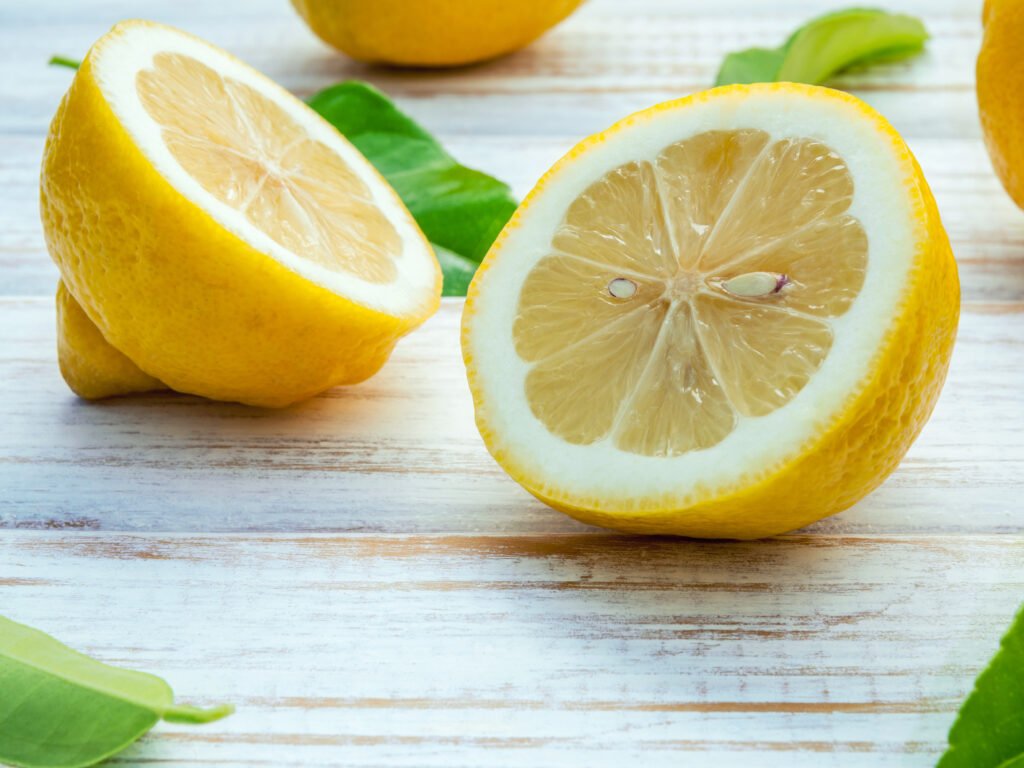
Lemon juice is a popular choice in natural skin care remedies for its ability to brighten and tighten the skin. However, due to its acidity, it’s essential to use it properly to avoid irritation.
How to Use Lemon for Skin Brightening
Follow these steps to safely incorporate lemon juice into your skincare routine:
- Dilute the Lemon Juice: Mix freshly squeezed lemon juice with an equal amount of water to reduce its acidity and minimize potential irritation.
- Apply to the Skin: Using a cotton ball, gently apply the diluted lemon juice to your face or other desired areas. Avoid the delicate eye area.
- Avoid Sunlight: After application, avoid direct sunlight to prevent photosensitivity and potential sunburn.
- Rinse Off: Leave the lemon juice on your skin for about 10 minutes, then rinse thoroughly with lukewarm water.
How It Works
The citric acid in lemon juice acts as a natural exfoliant, removing dead skin cells and revealing a brighter complexion. Additionally, it helps to tighten pores, giving your skin a smoother and more refined appearance. By incorporating lemon into your homemade skin care remedies, you can enjoy a more radiant and youthful-looking skin. Just remember to follow up with a moisturizer to keep your skin hydrated and balanced.
Read also: 12 Global Skincare Secrets: Beauty Rituals from Around the World
Final Thoughts
However, using natural skin care remedies in your daily routine can successfully help to solve the small issues without burdening up your face with neither chemicals. The variety of benefits with these DIY solutions such as aloe vera’s calming effects and turmeric anti-inflammatory properties proves just that. These remedies are also the grounded ones: They offer a broader view of keeping skin healthy. Nonetheless, do a patch test always to check this new product you bought with your skin. Furthermore, if you have long-standing skin complaints it is wise to speak with a doctor that specialises in this area of medicine. Instead, harness the power of nature for a healthier and more vibrant skin that can help you enhance your natural beauty with minimal effort.
call to action
Want to change up your skincare routine and try these natural skin care remedies? Begin adding these natural, homemade remedies to your routine today and you can experience the benefits of nature’s most beneficial ingredients. Leave your results in the comments below as well, and any special remedies that you love. Also, head to TURN ON POST NOTIFICATIONS if you wanna know more all of the skin care tips and hacks.RELATED: 6 Simple Steps To Get Your Besan Glow Back!! Natural beauty but also beautifully simple skin!
Disclaimer:
Though these natural skin care help in getting a glowing effect and keep the oil level under control, it is not sure that they get effective for everyone. This is why it is important that you try a patch test before using any new remedy. And if you have a persistent skin problem, or one that is severe to where it’s affecting your life, go see a dermatologist! Also, keep in mind that natural treatments are not a substitute for medical advice
References
- Aloe Vera: “Aloe vera: A Review of Its Efficacy and Safety” – Journal of Clinical Medicine, 2020. Link
- Tea Tree Oil: “Tea Tree Oil: A Review of Its Antimicrobial Properties and Clinical Efficacy” – Journal of Clinical Dermatology, 2017. Link
- Coconut Oil: “Coconut Oil and Its Benefits for Skin Health” – Journal of Dermatological Science, 2019. Link
- Apple Cider Vinegar: “Apple Cider Vinegar: Effects on Skin Health and pH Balance” – International Journal of Dermatology, 2018. Link
- Honey: “Honey as a Natural Treatment for Skin Conditions: A Review” – Journal of Medicinal Food, 2016. Link
- Turmeric: “Curcumin: A Review of Its Effects on Inflammation and Skin Health” – Phytotherapy Research, 2021. Link
- Green Tea: “Green Tea Polyphenols and Their Effects on Skin Health” – Journal of Nutritional Biochemistry, 2020. Link
- Neem: “Neem Oil: A Comprehensive Review on Its Uses and Efficacy for Skin Conditions” – Journal of Ethnopharmacology, 2017. Link
- Oatmeal: “The Efficacy of Colloidal Oatmeal in Treating Eczema and Other Skin Conditions” – Journal of Clinical Dermatology, 2018. Link
- Almond Oil: “Almond Oil: A Natural Emollient for Skin Health” – Journal of Dermatological Treatment, 2019. Link
- Aloe Vera (Moisturization): “Aloe Vera in Dermatology: A Review of Its Uses and Efficacy” – Dermatology Research and Practice, 2021. Link
- Oatmeal Bath: “Colloidal Oatmeal for Treating Dermatitis and Skin Irritations: A Systematic Review” – Journal of Pediatric Dermatology, 2018. Link
- Baking Soda: “Baking Soda in Dermatology: Uses and Considerations” – Clinical Dermatology Review, 2020. Link
- Garlic: “Garlic’s Antimicrobial Properties and Its Role in Acne Treatment” – Journal of Clinical Microbiology, 2019. Link
- Lemon: “Lemon Juice and Its Effect on Skin Brightening: A Review” – Journal of Dermatology Research, 2018. Link


Can you be more specific about the content of your article? After reading it, I still have some doubts. Hope you can help me.